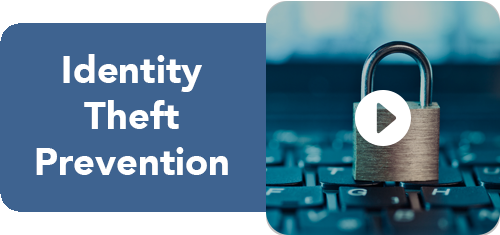At FLFCU, your security is of the utmost importance.

There are simple precautions that will help keep your identity safe. We've provided information to help you in protecting yourself from identity fraud and other criminal activities. Review the links and information on this page to learn how to protect your personal and financial information. We continually update this page as new scams, and information become available, so we encourage you visit this page often.
Suspicious Activity –What to do now?
- If you suspect suspicious activity on any FLFCU account or have provided your account information to an unknown source, contact us immediately at 855-866-9328, during normal business hours.
- If you suspect fraud with your Visa debit or credit card, get Visa fraud help here.
- If you suspect fraud related to ACH or wire transactions, contact us immediately at 855-866-9328, during business hours. There are time frames associated with these transactions and we would like to assist in preventing further loss.
- FLFCU will NEVER contact you by email, phone, or text message to ask you for your account number or other account information. There is no reason for us to verify this information in this manner, as we already have all of the information.It is important that you never respond to phone calls, text messages, or emails that ask you to provide, validate, or update any account information. If you do receive any types of these requests, please contact us immediately at 855-866-9328, during business hours.
Credit /Debit Card Breaches –What you need to know!
Credit Cards
It is very important to always monitor your account for activity! If you suspect fraud on your credit card: Get fraud help here.
Debit Cards
If you have recently used your card at a retailer where a card data compromise has occurred, you may choose to change your PIN as an added safeguard, in addition to monitoring your account regularly.
- If you have received your PIN and would like to select a new one, call 1-866-297-3411.
- It is a good idea to change your PIN periodically to better protect your account.
- Ensure no one sees your PIN when you enter it. Memorize your PIN; don’t write it down anywhere—especially on your card—and never share it with anyone.
- Do not send your card number through email, as it is typically not secure.
- Do not give out your card number over the phone unless you initiated the call.
Passwords - Best Practices
- Select strong passwords that are different for all of your important accounts. Use a randomized series of at least 8 characters that includes a mix of letters, numbers, and symbols. Letters should contain a variety of upper and lower case.
- Change your passwords regularly - every 60 to 90 days.
- Don't use a password that includes your name, family names, workplace, SSN, DOB, address, etc.
- If you need to write down your password in order to remember it, make sure you don't label it as your password, and keep it in a safe place.
Multi-Factor Authentication Further Protects Your Information
FLFCU's online banking system features an additional layer of security to further protect your online banking account called multi-factor authentication. Here’s how it works.
- You will be prompted to choose either phone call or text as a means of contacting you in the event you attempt to access your account from any device.
- Whatever method you choose to be contacted (phone call or text), you will be notified with a verification code that you must enter in order to access your account. If you do not enter the verification code, both accurately and timely, you will not be able to access the account.
Protect Yourself on Your Mobile Device
- Install an antivirus/anti-malware app on both your personal computer and your mobile device and keep it updated.
- Configure your mobile device to automatically receive security updates on Android devices.
- Update iOS versions as new versions become available on Apple devices.
- Avoid installing Android apps from third-party websites or unreliable sources.
- Read the permissions requested by every application before installing.
- Perform regular backups of data stored in Android devices.
- Protect devices with passwords.
- Don't view or share personal information over a public wi-fi network.